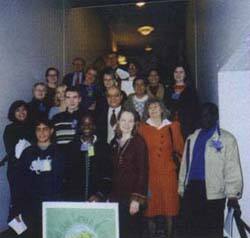Helsinki, Finland, 11-16 December 2001
Objectives
Five main objectives of the Workshop
- Present recent WHE achievements and the results of the external World Heritage Evaluation
- Make proposals for the integration of the World Heritage Education Kit in school curricula
- Chart the future path for the development of the World Heritage Education Project
- Recommend proposals for the 30th Anniversary of the World Heritage Convention
- Present the Workshop outcome to the World Heritage Committee
Pledge
- Recognize that we represent the future generations, we hereby pledge to protect the World Heritage and resolve to take action, individually and collectively, to preserve it. To this end, we have formulated recommendations for the future of World Heritage, and the UNESCO World Heritage Education Project.
Firstly and most importantly, we have adopted resolutions on actions which we each will take individually and in our schools to further World Heritage Education and World Heritage awareness at the most basic local and personal level. - We have also formulated recommendations for national action which we will pass along to our national ministers, politicians and other leaders, and to the UNESCO National Commission for our respective countries and we will report back to the Youth Forum organizers in Karlskrona by March 2002 to give them our results.
- Finally, we have formulated recommendations for action by UNESCO and/or the World Heritage Committee. The recommendations to UNESCO and the World Heritage Committee include recommendations for immediate action, recommendations for future activities for the long term development of the Project, as well as recommendations for ways to celebrate the 30th Anniversary of the 1972 Convention on the Protection of the World's Cultural and Natural Heritage ("the World Heritage Convention") in the year 2002.
Recommendations
During the Workshop the participants have selected ten recommendations from Karlskrona Recommendations which are visible and can be realized on local, national and international level starting. All participants were committed to encourage their schools in realizing those recommendations, which are:
- Include World Heritage Education in the curricula and linking World Heritage with education to make the students aware of these sites to preserve and promote them;
- Continue with sub-regional workshops in collaboration with site managers, education specialists and education experts for effective articulation and implementation of the World Heritage Education Program;
- Seek support with heritage volunteers and mobilize students and teachers for on site skills training aiming to perform volunteer work at the World Heritage sites;
- Continue with ‘This is Our Time" -project with World Heritage as common theme (in line with 30th Anniversary of World Heritage Convention) and expand the collaboration with developing countries who have an internet access;
- Maximize the use of World Heritage emblem for an increase in visibility using media tools such as radio, TV and on printed material;
- Support the intangible heritage such as oral tradition "Houd Houd of Ifugae" in the Cordilleras Rice Terraces in Philippines;
- Support the marathon or "Mini Olympics" ailing to raise funds in support of preservation of World Heritage sites;
- Screen corporate sponsors;
- A World heritage Day; as a contribution to the celebration of the 30th Anniversary of the World heritage Convention 2002; the group suggested that all ASPnet schools should be invited to organize a World Heritage Day at their school in according to the Karlskrona recommendations. The schools choose itself on what day during the 2002 this day will be organized.
Activities for such a day could be:
World Heritage marches, Drama and dance at World Heritage sites, Marathon, Fundraising in favor of World Heritage;
Long-term commitment at the national level:
Long term national plans in as many as possible State Parties must be encouraged including national elaboration of translations and adaptations of the World Heritage Education Kit.
A simplified version of the Convention should be developed with youth friendly material made by students for young people.
Conclusions
- Empowerment of the Youth
- Inclusion of World Heritage Education in national curricula
- Link education and conservation
- Sub-regional workshops
- World Heritage volunteers
- Visibility of World heritage emblem
- Oral narrative and intangible traditions
- 30th Anniversary of the WH Convention
- Annual topic on World Heritage Education
Organizers
Finnish National Commission for UNESCO
the Finnish National Board of Education
the UNESCO Associated Schools Project (ASP) Network
UNESCO World Heritage Centre
Participants and observers
16 participants:
General Coordinator of ASP, Egypt; ASPnet National Coordinator, Norway; ASPnet Regional Advisor for the Arab States, Middle East (UNESCO Amman Office); ASP Coordinator UNESCO Paris; UNESCO WH Education Project; ASPnet National Coordinator, Philippines; Swedish National Commission for UNESCO, 7 students from Finland (4), Norway (1), Peru (1), Senegal (1); Ms Denise Pozzi-Escot, Archaeologist, Peru; Mr Doudou Gaye, teacher, Senegal;
Countries represented
Amman, Egypt, Finland, France, Norway, Peru, Philippines, Senegal, Sweden
